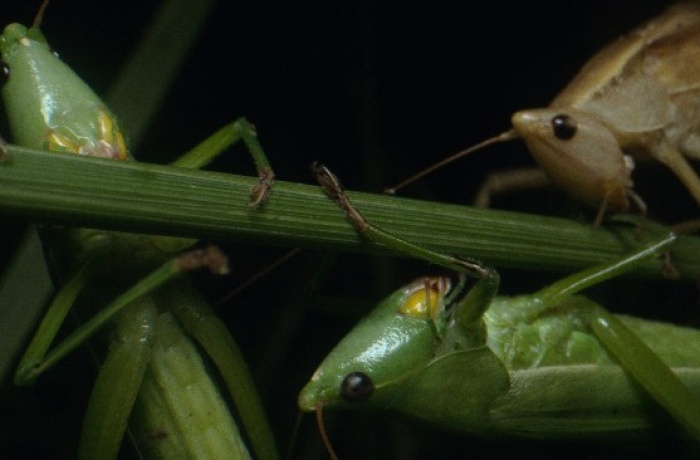
Every rainy season, deep in the mountain forests of western Uganda, one of the world’s greatest natural phenomena takes place.
Millions, sometimes billions of long-horned grasshoppers swarm together to mate in a rarely-filmed reminder of nature’s epic scale. As if to underline the magic fickleness of this spectacle, these living clouds can descend for a moment before vanishing into the night as quickly as they came.
It follows that mankind has found a way to profit from this beautiful reproductive cycle. Harvesting grasshoppers in rural Uganda is a seriously lucrative business; fortunes are made in a matter of weeks by providing this seasonal delicacy to hungry city-dwellers in the lowlands.
Comprehensively filmed over the course of three seasons, Grasshopper Republic (which is also the locally-given name for the region) follows a local trapping team in strict verité style, as these modern-day prospectors push into remote forests and villages seeking their fortune by capturing this elusive prey by the barrelful. We witness massive generators being hauled up collapsing mudbanks. Light posts are erected with chemically treated bulbs, casting a lurid neon-green pall over the tree canopy, irresistibly attracting the swarm to their corrugated iron traps. In deliberate contrast to this dystopian imposition, specialised macro-cameras simultaneously transport the audience into an immersive natural world on a level with the perspective of the grasshoppers. A parade of frame-filling bugs heightens this magnified reality — accentuating the bizarrely human-like qualities of these insects while also highlighting the peril that lies behind every leaf.
The risk to the human hunters is all too real as well. As our metaphor on Man’s fraught relationship with Nature continues to unfold, we learn the harrowing cost that these toxic lights bestow upon our band of trappers and their homeland. A scorched earth of skin disease and ruined crops reveals the downside of this gold rush.
Grasshopper Republic explores this strange, beautiful, and dangerous predicament by examining the balance of survival between communities and ecosystems.

Daniel McCabe is an American filmmaker and photographer currently based in New York. As a photo/video journalist McCabe has covered gang conflict in Honduras, Kenya’s 2008 post-election violence, the 2010 earthquake in Haiti and the ongoing conflict in the Democratic Republic of the Congo (2008-2015). He has traveled extensively in Africa and his work has appeared in the National Geographic, the New York Times, Time magazine, the BBC, Al Jazeera and CNN among others. Daniel’s first feature-length documentary film, This Is Congo, tells the story of four lives lived amongst war in the Democratic Republic of the Congo. It premiered in 2017 at the 74th Venice International Film Festival, and has won numerous awards worldwide.

